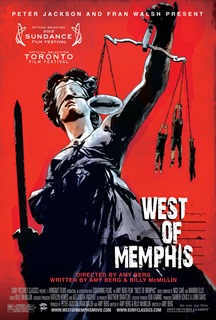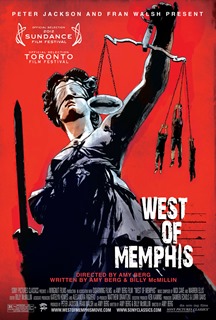 I have to admit that I was a bit skeptical when I first heard of the new West Memphis Three documentary West of Memphis. As interesting as this story is, I thought that the saga of these three men imprisoned for the murder of three boys in West Memphis, Arkansas was more than covered in the trilogy of Paradise Lost documentaries by Joe Berlinger and Bruce Sinofsky and that there was really not much more that can be said. However, after seeing the film, it turned out that I was wrong. For the most part, the Paradise Lost films were a very in-depth analysis of the case of the whole, which had a particular focus on the West Memphis Three themselves. West of Memphis, on the other hand, focuses on the large multi-year effort to prove that the West Memphis Three were innocent of their crimes. Arguably, the main focus of the film is Lorri Davis, who felt a connection with WM3 member Damien Echols and went on to fall in love and marry him, while he is sitting on death row for the crimes. Davis has been focusing all of her time and resources on proving the West Memphis Three’s innocence. These efforts gained a lot of celebrity support from the likes of Peter Jackson, who offered to fully fund the investigation (and is producer of the documentary), Henry Rollins, and Eddie Vedder. The bulk of the film is spent detailing the independent investigation, which utilized private investigators and FBI profilers. As detail after detail gets revealed, it becomes more apparent that this case was a major miscarriage of justice. The investigation reveals everything from falsified evidence, compromised forensic experts, and a general “guilty until proven innocent” attitude by law enforcement. On top of that, the film gives a convincing hypothesis about who the real killer actually is. It’s so convincing, that it’s almost sickening that this individual will never get to pay for his crimes. West of Memphis was being produced at roughly the same time as Paradise Lost 3: Purgatory and the two films feature much crossover information. For instance, Paradise Lost 3 also has the aforementioned suspect hypothesis, even though West of Memphis goes into much greater detail. I hate to say it, but Paradise Lost 3 was the victim of bad timing. In some ways, the third Paradise Lost film was trying to make-up for the fact that the entire second film was devoted to an alternate suspect hypothesis that ultimately turned out to be false. At the same time, the third Paradise Lost film was being made with the thesis that there was no end in sight for the West Memphis Three case, hence the subtitle Purgatory. A mere month before Paradise Lost 3 was set to premiere at the 2011 Toronto International Film Festival (which is where I saw it), the West Memphis Three made a very rare plea, in which they would plead guilty, while maintaining their claim to innocence. This resulted in a last minute epilogue to be created for Paradise Lost 3, which was not ready when I saw it at TIFF. West of Memphis has a great advantage of being able to go into much more detail about this plea, which resulted in the West Memphis Three being released after 18 years in prison. It is most definitely a very bittersweet ending to the whole saga. While the West Memphis Three have finally experienced freedom, there will likely be no more development in the case, since, in the eyes of the law, the three admitted that they were guilty. In fact, there is an almost sickening moment when the attorney general who accepted the plea all but gloats how it saved his career, since if there was another trial that found the three innocent, the judicial system would’ve been open for a lawsuit. However, it’s very obvious that the West Memphis Three are just happy to be finally out of prison. I should note that this is the only moment in the film, where all three members are seen and interviewed. Other than that, the film focuses solely on Damien Echols (who is listed as a producer) and his relationship with Lorri Davis. Overall, it would not be fair to compare West of Memphis to the Paradise Lost films, since they both go hand-to-hand. If it wasn’t for the release of Paradise Lost in 1996, the case of the West Memphis Three probably wouldn’t have received as much attention as it did. Joe Berlinger and Bruce Sinofsky kept track of the case ever since and released a couple of “where are we now” follow-ups. As such, the Paradise Lost films are a good choice if you want to see the in-depth developments of the case from beginning to end. West of Memphis, on the other hand, is a film to see if you just want a single film summary of the entire saga. The film works at providing everything you need to know about the case and I highly recommend checking it out.10 | LOVED IT
I have to admit that I was a bit skeptical when I first heard of the new West Memphis Three documentary West of Memphis. As interesting as this story is, I thought that the saga of these three men imprisoned for the murder of three boys in West Memphis, Arkansas was more than covered in the trilogy of Paradise Lost documentaries by Joe Berlinger and Bruce Sinofsky and that there was really not much more that can be said. However, after seeing the film, it turned out that I was wrong. For the most part, the Paradise Lost films were a very in-depth analysis of the case of the whole, which had a particular focus on the West Memphis Three themselves. West of Memphis, on the other hand, focuses on the large multi-year effort to prove that the West Memphis Three were innocent of their crimes. Arguably, the main focus of the film is Lorri Davis, who felt a connection with WM3 member Damien Echols and went on to fall in love and marry him, while he is sitting on death row for the crimes. Davis has been focusing all of her time and resources on proving the West Memphis Three’s innocence. These efforts gained a lot of celebrity support from the likes of Peter Jackson, who offered to fully fund the investigation (and is producer of the documentary), Henry Rollins, and Eddie Vedder. The bulk of the film is spent detailing the independent investigation, which utilized private investigators and FBI profilers. As detail after detail gets revealed, it becomes more apparent that this case was a major miscarriage of justice. The investigation reveals everything from falsified evidence, compromised forensic experts, and a general “guilty until proven innocent” attitude by law enforcement. On top of that, the film gives a convincing hypothesis about who the real killer actually is. It’s so convincing, that it’s almost sickening that this individual will never get to pay for his crimes. West of Memphis was being produced at roughly the same time as Paradise Lost 3: Purgatory and the two films feature much crossover information. For instance, Paradise Lost 3 also has the aforementioned suspect hypothesis, even though West of Memphis goes into much greater detail. I hate to say it, but Paradise Lost 3 was the victim of bad timing. In some ways, the third Paradise Lost film was trying to make-up for the fact that the entire second film was devoted to an alternate suspect hypothesis that ultimately turned out to be false. At the same time, the third Paradise Lost film was being made with the thesis that there was no end in sight for the West Memphis Three case, hence the subtitle Purgatory. A mere month before Paradise Lost 3 was set to premiere at the 2011 Toronto International Film Festival (which is where I saw it), the West Memphis Three made a very rare plea, in which they would plead guilty, while maintaining their claim to innocence. This resulted in a last minute epilogue to be created for Paradise Lost 3, which was not ready when I saw it at TIFF. West of Memphis has a great advantage of being able to go into much more detail about this plea, which resulted in the West Memphis Three being released after 18 years in prison. It is most definitely a very bittersweet ending to the whole saga. While the West Memphis Three have finally experienced freedom, there will likely be no more development in the case, since, in the eyes of the law, the three admitted that they were guilty. In fact, there is an almost sickening moment when the attorney general who accepted the plea all but gloats how it saved his career, since if there was another trial that found the three innocent, the judicial system would’ve been open for a lawsuit. However, it’s very obvious that the West Memphis Three are just happy to be finally out of prison. I should note that this is the only moment in the film, where all three members are seen and interviewed. Other than that, the film focuses solely on Damien Echols (who is listed as a producer) and his relationship with Lorri Davis. Overall, it would not be fair to compare West of Memphis to the Paradise Lost films, since they both go hand-to-hand. If it wasn’t for the release of Paradise Lost in 1996, the case of the West Memphis Three probably wouldn’t have received as much attention as it did. Joe Berlinger and Bruce Sinofsky kept track of the case ever since and released a couple of “where are we now” follow-ups. As such, the Paradise Lost films are a good choice if you want to see the in-depth developments of the case from beginning to end. West of Memphis, on the other hand, is a film to see if you just want a single film summary of the entire saga. The film works at providing everything you need to know about the case and I highly recommend checking it out.10 | LOVED IT

